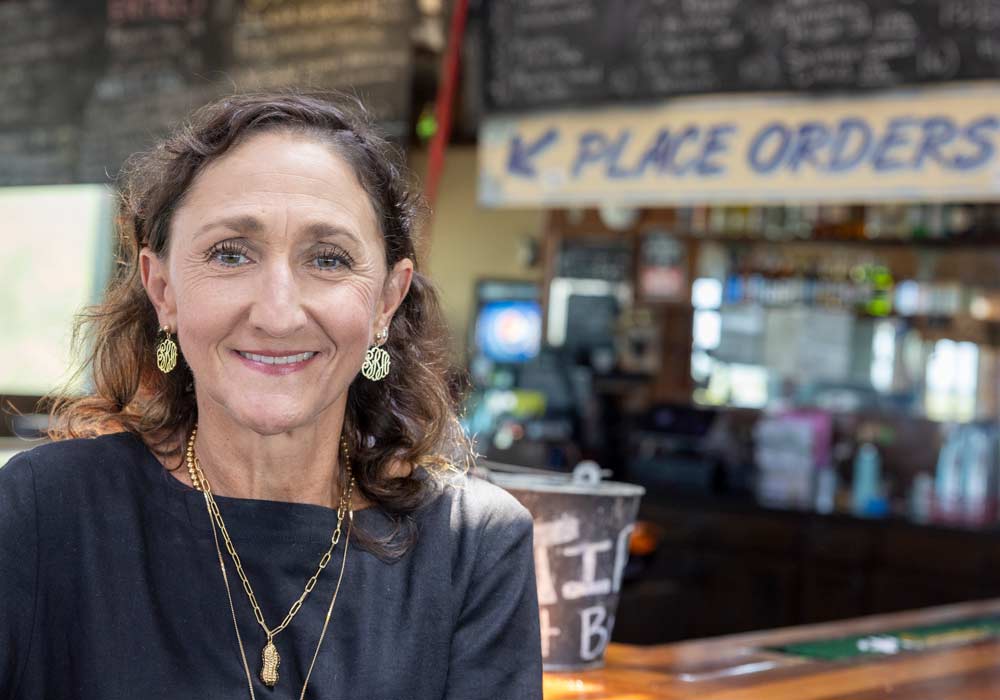When Carolinian magazine was looking for a scenic Low Country location for an interview and photo session with University of South Carolina alumnus and donor Alex Molinaroli and his brothers for the fall 2024 issue, Bowens Island was top of the list.
Not only did the namesake of USC’s newly christened Molinaroli College of Engineering and Computing have fond memories of the iconic waterfront oyster shack; the Barber family, which started serving oysters, shrimp and other seafood on the property shortly after WWII, has deep connections to the state’s flagship public university.
“My dad is the oldest of six siblings, and he is the only one who did not go to Carolina,” says Hope Barber, Bowens Island operations manager. “Dad went to Wofford, and then he went to law school at South Texas, but all his brothers, and his only sister, went to Carolina. My family has always been a big Carolina family.”
And that includes Hope. Before she came home to help run the family business, before she retired from her long career as an English teacher, she earned two degrees at USC: a bachelor’s in English from the South Carolina Honors College, ’94, and a law degree, ’98. “Dad was always a big proponent of getting a liberal arts education,” she says.
“A lot of people would come out and fish off of the dock or wherever and then ask my great grandmother to cook what they caught. I guess she got tired of doing that for free, and that's sort of how she ended up in the restaurant business.”
For additional evidence, she points to her younger brother Matt, 2000 philosophy, Dad’s sister Karen, ’82 experimental psychology, and Karen’s husband, Cas Danielowski, ’84 criminal justice, who was also an offensive lineman for the Gamecocks in the early 80s: “They live on the island, too.”
Indeed, the family still owns all but two parcels on the island, and at different times you may run into any number of them at the restaurant, behind the bar, working the register — pitching in at the family business however they can. Hope’s adult children have other careers in the Charleston area, but they, too, are known to pick up a shift.
But it’s Hope who you talk to if you’re booking one of the sprawling restaurant’s spaces for an event or inquiring about a magazine photo shoot. She also deals with marketing and media inquiries and manages many of the restaurant’s day-to-day operations. Dad, meanwhile, is longtime Bowens Island proprietor and former South Carolina legislator Robert Barber, who lives next door to the business.
Nowadays, you can find someone in the extended Barber clan behind nearly every door on Bowens Island, but it wasn’t always that way. When Hope Barber’s great-grandmother, Sarah May Bowen, purchased the property in the 1940s, it was more or less uninhabited.
“My grandmother, who's still alive, says that when they first came out here it was just a bunch of moonshine stills and goats,” says Hope, whose own house is just up the sandy road from Dad’s. “They would tip the stills over, come back a couple weeks later, and they would be up and running again.”
At the time, there was no road into the wooded enclave, and there was no causeway over the marshy creeks that separate the island from Folly Road. “You had to wait ’til it was high tide and row out to the island on a boat,” says Hope.
But that didn’t stop Sarah May from setting up a kitchen, even if it was originally something less than a moneymaker — or even a bona fide business.
“A lot of people would come out and fish off of the dock or wherever and then ask my great grandmother to cook what they caught,” Hope explains. “I guess she got tired of doing that for free, and that's sort of how she ended up in the restaurant business.”
Over the next 75 years, the onetime dockside fish camp grew in both size and reputation, especially among locals. After Charles Kuralt interviewed the family matriarch for his CBS Evening News “On the Road” series, the legend spread further. And then in spring 2006, Bowen’s Island won a James Beard America's Classics Award, and regional popularity gave way to a national reputation.
That same fall, the restaurant was destroyed by an electrical fire. It was a significant setback — “It took nearly four years to fully rebuild everything,” says Hope — but it wasn’t a death knell. Neither, for that matter, was COVID. They rebounded from the former, using a “satellite kitchen” while they rebuilt the main restaurant, and soldiered through the latter. Now, business is once again booming.
In a year, they now sell about 55,000 pounds of shrimp and about 3,000 bushels of wild oysters. And while things may slow down a little in July and August, once the weather cools off and oyster season hits, they’ll typically book 2-3 events a week on top of their normal lunch and dinner business.
Along with being part of a family business with a storied history, being part of other people’s lives makes the job satisfying for Hope.
“In the oyster room, you get this sense of community, of people coming together for an experience,” she says. “And we do a lot of rehearsal parties and weddings, things like that, and helping people celebrate those important moments is really special.”
